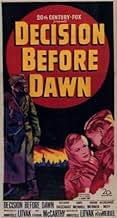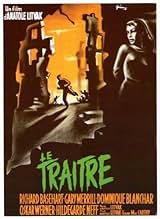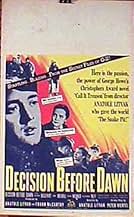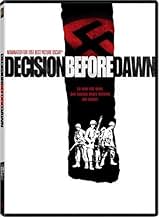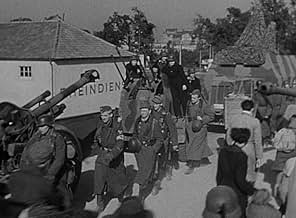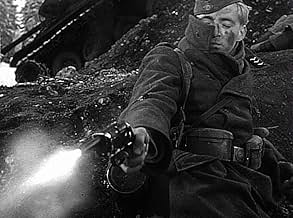CALIFICACIÓN DE IMDb
7.2/10
3.2 k
TU CALIFICACIÓN
As the US Army approaches Nazi Germany, they recruit German prisoners of war to spy behind German lines.As the US Army approaches Nazi Germany, they recruit German prisoners of war to spy behind German lines.As the US Army approaches Nazi Germany, they recruit German prisoners of war to spy behind German lines.
- Dirección
- Guionistas
- Elenco
- Nominado a 2 premios Óscar
- 1 premio ganado y 4 nominaciones en total
Hildegard Knef
- Hilde
- (as Hildegarde Neff)
Wilfried Seyferth
- Heinz Scholtz - SS Man
- (as Wilfried Seyfert)
Robert Freitag
- Sgt. Paul Richter
- (as Robert Freytag)
Harold Benedict
- Lt. Pete Gevers
- (as H.L. Benedict S/Sgt. USAF)
H.W. Briggs
- Self
- (as H.W. Briggs Sgt. USA)
D.G. Devine
- Lt. Rennick's Driver
- (as D.G. Devine Cpl. USAF)
L.E. Dixon
- Self
- (as L.E. Dixon Maj. USA)
B.L. Hendrickson
- Self
- (as B.L. Hendrickson T/Sgt. USA)
Opiniones destacadas
Close to the end of WW2, the US military recruits Nazi defectors from the ranks of German POW's to return to Germany as spies. Klaus Kinski makes a brief appearance during the interview process, but his character is rejected. Who is accepted to participate in this mission is incomparable Oskar Werner as Corporal Karl Maurer who is given the code name Happy. It's an ironic name for such a serious actor. He's perfect for the part in this heavy film set largely in the destruction of bombed out cities. Such a setting makes it difficult for the Germans to actually capture him, as when they are on to his trail, the aerial Allied bombings begin again. There are lots of places to hide amidst the treacherous ruins of the near collapsing buildings.Yet the Germans try to maintain discipline to the very end, as a deserter is hanged and his body is left for all to see. The film uses the destruction in which it is set and reminds us of how things change when the peace time environment becomes lost amidst the destruction. Werner goes through several meetings with Germans, the best being the Colonel who orders the deserter to be hanged, and another with the tragic character played by Hildegard Knef, whom he meets in a bar. Amidst the desperation still lurks a couple of true Nazi believers, one played quite well by Wilfred Seyferth as Heinz Scholtz, a dangerous SS man who befriends the traitor Werner. The film is overwhelmingly stark and lacks any sense of humor whatsoever, but in my book that just adds to the overall effect, much like some of the Cold War era spy films, such as The Spy Who Came In From The Cold.
Those were the outcasts of WW2.German war prisoners who decided to rebel against their country.
Karl-aka "Happy" - agrees to become a spy in the "pay" of Americans at the end of WW2 in his country .A country in ruins.The "Third Reich " which should have lasted one thousand years was collapsing.Oskar Werner gives a restrained moving performance.If "underacting" has a meaning (not meant pejoratively) ,that's exactly what it is.He watches his country fall as if he does not belong there anymore.He meets people he used to know ,a girl (Knef) he could love (but he won't),but he knows from the start that wherever he goes,he is an outcast.His new "Friends" use him as a pawn in their game,and " his motherland will not cradle him anymore" .
Anatole Litvak,an European who used to work in France -where the first scenes take place- in the thirties (and later would in the fifties/sixties)knows what he is talking about.He joined the army during WW2;and "decision before dawn" was one of his finest achievements .
Like this? try this...
Vent d' Est Robert Enrico 1993
Karl-aka "Happy" - agrees to become a spy in the "pay" of Americans at the end of WW2 in his country .A country in ruins.The "Third Reich " which should have lasted one thousand years was collapsing.Oskar Werner gives a restrained moving performance.If "underacting" has a meaning (not meant pejoratively) ,that's exactly what it is.He watches his country fall as if he does not belong there anymore.He meets people he used to know ,a girl (Knef) he could love (but he won't),but he knows from the start that wherever he goes,he is an outcast.His new "Friends" use him as a pawn in their game,and " his motherland will not cradle him anymore" .
Anatole Litvak,an European who used to work in France -where the first scenes take place- in the thirties (and later would in the fifties/sixties)knows what he is talking about.He joined the army during WW2;and "decision before dawn" was one of his finest achievements .
Like this? try this...
Vent d' Est Robert Enrico 1993
A taut story, first-rate acting, and a compelling subject make this film worth seeing.
Espionage/spying is a tricky subject, but "Decision Before Dawn" handles it brilliantly. No flash, no Mata Haris, no absurd coincidences. Weaving human drama and the grim realism of war, this film is that rare gem that manages to teach without preaching.
Among the superb performances is our hero Happy, played with just the right blend of suspense and humanity by Oskar Werner. Happy (an ironic name given to him by his American overseers) is torn between love of his native land and his duty to what is right. Werner walks this tightrope better than most I've seen.
In the end, however, it's the script that is the true gem of the film. Peter Viertel is a master story teller, with such great screenplays as "Saboteur" and "The Hard Way" to his credit. Viertel, with a story by author George Howe, weaves an intricate, but not confusing, narrative of war and devotion and duty. He's one of the few _writers_ I look for when I check out "On TV This Week" on IMDB.
Espionage/spying is a tricky subject, but "Decision Before Dawn" handles it brilliantly. No flash, no Mata Haris, no absurd coincidences. Weaving human drama and the grim realism of war, this film is that rare gem that manages to teach without preaching.
Among the superb performances is our hero Happy, played with just the right blend of suspense and humanity by Oskar Werner. Happy (an ironic name given to him by his American overseers) is torn between love of his native land and his duty to what is right. Werner walks this tightrope better than most I've seen.
In the end, however, it's the script that is the true gem of the film. Peter Viertel is a master story teller, with such great screenplays as "Saboteur" and "The Hard Way" to his credit. Viertel, with a story by author George Howe, weaves an intricate, but not confusing, narrative of war and devotion and duty. He's one of the few _writers_ I look for when I check out "On TV This Week" on IMDB.
10B24
Occasionally I rate a film high for personal and sentimental reasons. In this case I am compelled by objective facts to add in the light of greater perspective that I consider this one of the best war movies of all time.
In the first place, the acting is superb. The casting is flawless. The direction is taut, as is the editing. It is filmed in black and white, as it would have to be even today if someone wanted to try a remake. The locations and sets are authentic to a "T." The story itself follows faithfully the text of a book I read as a child (before I saw the film, in fact).
Moreover, I consider it an act of bravery on the part of the film's producers even to begin a project like this so soon after the end of World War II, when passions against the Germans were still running high and mere caricatures of that nation's common people remained the standard for the day (and for years to come).
Oskar Werner in the main role was a brilliant choice, and veterans Richard Basehart and Gary Merrill provide ample evidence that casting proceeded on a basis of resolute excellence and authenticity. I am still blown away by revisiting the "Romantic Road" in Germany and thinking how this movie defined and continued to define for me how recent and ancient history converged along that path.
I cannot praise it enough.
In the first place, the acting is superb. The casting is flawless. The direction is taut, as is the editing. It is filmed in black and white, as it would have to be even today if someone wanted to try a remake. The locations and sets are authentic to a "T." The story itself follows faithfully the text of a book I read as a child (before I saw the film, in fact).
Moreover, I consider it an act of bravery on the part of the film's producers even to begin a project like this so soon after the end of World War II, when passions against the Germans were still running high and mere caricatures of that nation's common people remained the standard for the day (and for years to come).
Oskar Werner in the main role was a brilliant choice, and veterans Richard Basehart and Gary Merrill provide ample evidence that casting proceeded on a basis of resolute excellence and authenticity. I am still blown away by revisiting the "Romantic Road" in Germany and thinking how this movie defined and continued to define for me how recent and ancient history converged along that path.
I cannot praise it enough.
For anyone who is used to freedom, this movie shows better than any other what it is like to live in a total police state. The Thousand-Year Reich is shown with every wart and blemish, making this one of the greatest propaganda movies for freedom. But it is a harrowing experience, a true thriller. For the life of me, I cannot understand why this film is not better known and why it is hardly available in public libraries. Could this reflect the conservative, McCarthyite influence on movies? I think it is a must-see.
¿Sabías que…?
- TriviaOne of the first films after World War II to portray the German people--outside of the Nazi regime--in a sympathetic light.
- ErroresKarl is mistakenly called a corporal. The Luftwaffe uniform that he wears both in the US POW cage and while back in Germany has the rank insignia of an "Obergefreiter", specifically three winged emblems on the collar patches, plain shoulder straps and two chevrons on his left sleeve. Also when the list is checked for his name at the bridge the rank is written down as 'Gfr' (gefreiter) The ranks of Gefreiter, Obergefreiter and Stabsgefreiter (all which were partially identified by chevrons on the sleeve) were not NCOs and had no command authority over other soldiers. They were simply grades of seniority and would be more equivalent to Private First Class (PFC) in the US military. The German rank that is the closest equivalent to Corporal is Unteroffizer. Also, Karl is wearing the medical badge on his right sleeve; Luftwaffe enlisted medical personnel wore the badge on the left sleeve, while Wehrmacht (army) wore it on the right.
- Citas
Lt. Dick Rennick: [Intro narration] Of all the questions left unanswered by the last war, and probably any war, one comes back constantly to my mind. Why does a spy risk his life... for what possible reason? If the spy wins, he's ignored. If he loses, he's shot.
- ConexionesReferenced in Esa chica: Decision Before Dawn (1968)
- Bandas sonorasAch, wie ist' möglich dann (Treue Liebe)
(uncredited)
Written by Friedrich Kücken (1827)
Selecciones populares
Inicia sesión para calificar y agrega a la lista de videos para obtener recomendaciones personalizadas
- How long is Decision Before Dawn?Con tecnología de Alexa
Detalles
- Fecha de lanzamiento
- Países de origen
- Idiomas
- También se conoce como
- Decision Before Dawn
- Locaciones de filmación
- Productoras
- Ver más créditos de la compañía en IMDbPro
- Tiempo de ejecución
- 1h 59min(119 min)
- Color
- Relación de aspecto
- 1.37 : 1
Contribuir a esta página
Sugiere una edición o agrega el contenido que falta


